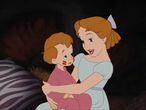Parents' educational styles will have consequences for their children's ability to adapt socially and emotionally. These styles must be understood flexibly and adapted to each child, since each one has its own personal characteristics. When we speak of norms and rules we speak of limits, and limits are necessary because they give the child security, they convey what is expected of him and when they are well placed they promote self-control and self-regulation. The health psychologist and director of the Uditán Clinic Margot Ripoll considers that in general it is not the limit that should be questioned, but how it is set and how it is managed since they have a direct relationship with the feeling of belonging, self-esteem and validity."At the beginning of development the limits are closely linked to the routines and needs of children, but as they get older things get more complicated, more evolved emotions appear and they are fundamental for the correct development of empathy, tolerance to frustration and self-esteem ”.
More information
Educate children in gratitude, an essential pillar for their happiness
Wendy syndrome: what is it and what problems does it entail
For Margot Ripoll, the good limits are those that exist, but are not noticeable: “They should be few since many would restrict the child's freedom and prevent him from exploring and discovering possibilities in the environment, they must also be brief because self-control is acquired progressively. A two-year-old can learn to wait 2 minutes but not 20. The limits have to be clear and well defined, and to be able to be positive and directed to what can be done. It is common to define the limit from no, but it is very difficult for our brain to decipher the reverse language and at certain ages they still cannot make the opposite actions visible. So it's better to say let's jump on the carpet than to say don't jump on the couch. " Margot talks about superimposing coherent and realistic patterns with our family dynamics,since we too must assume that limit. For example, we cannot demand that they keep the mobile on the table if we have it in sight. And he adds as very important to establish limits in advance, since only in this way they promote self-control, emotional regulation and moral reasoning.
The psychologist Sara Tarrés tells us about balance: “It is true that one of the difficulties is in finding the middle ground between permissiveness and authoritarianism and that many times mothers move between both poles, generally due to fatigue, stress or improvisation in the face of issues that had not been raised so far. It is important to stop and think and learn how to set limits and norms for our children because it is so damaging to be totally inflexible or, on the contrary, excessively condescending. Nor does it favor changing criteria depending on what mood we are that day. We must be clear about the values that we transmit with the rules and limits that we establish, what is the objective of that no or that yes and what consequences it has in the short, medium and long term ”.
Keep in mind that educating means allowing our children to evolve, letting them make small decisions even at the risk of making mistakes. We must be flexible at times and allow them to express their opinions, even if that does not mean that we allow them to break the rules or the limits set. “Listening, attending to and understanding their requests, in short, empathizing with them, does not mean letting them take control of what can or cannot be done at home or away from home. It means taking them into account and letting them know that we care about them and for that very reason explaining that we are the adults who make the decisions ”, says Sara Tarrés, author of
My Uncovered Emotions. Guide and emotional notebook for family work
(Ed Salvatella).
For Tarrés, both being permissive and authoritarian are negative educational styles because they prevent optimal and healthy emotional development of children. He considers that both damage self-esteem and create insecure, rebellious children with a greater tendency to suffer in the long term some type of problems or behavior disorders, anxiety or depression. “Authoritarian mothers are inflexible, rigid, unaffectionate mothers with low levels of communication with their children. An excess of control and lack of affection can cause our children emotional problems such as low self-esteem, shyness, submission or rebellion. Children grow up afraid of making mistakes, since they are usually punished for them, which leads them to lie to avoid them ”, says the psychologist.
Mothers with an educational style based on permissiveness are the polar opposite of above.
According to Sara Tarrés “they are affectionate and communicative, but they believe and think that rules and limits should not be set, that is why children grow up believing that they can do and say anything without consequences, that they do not have any kind of responsibility and that any mistake they make is the fault of a third party.
They grow up as little dictators whose parents are at their disposal and are more prone to exert child-parent violence, of which we speak so little ”.
That is why, as Aristotle said, virtue is in the middle.
You can follow De mamas & de papas on
,
or sign up here to receive
our weekly newsletter
.















